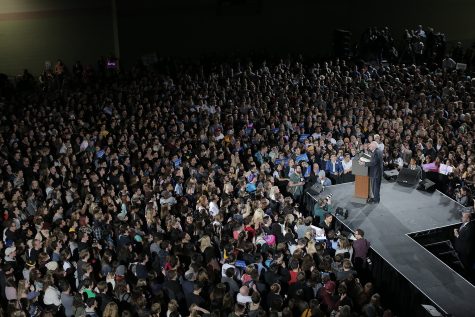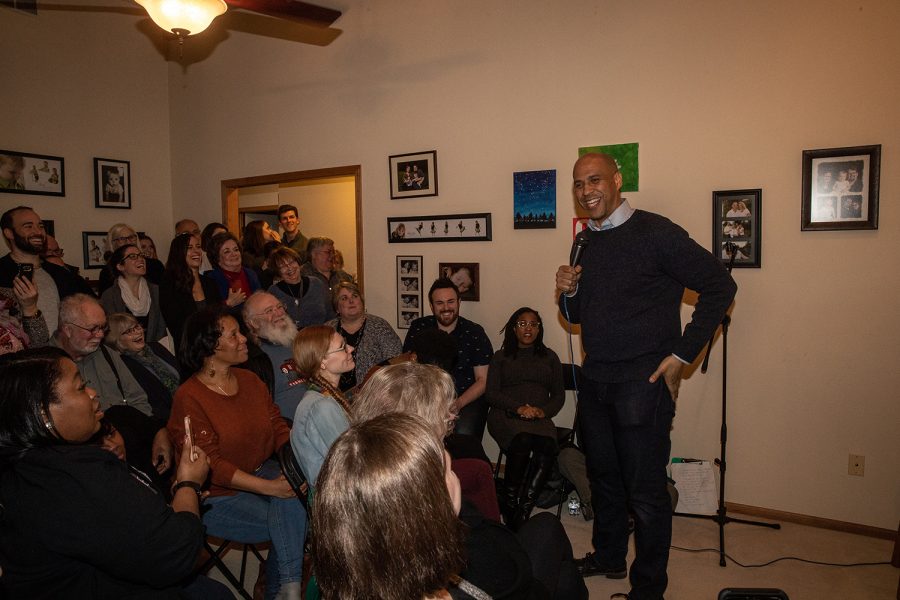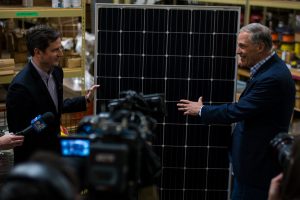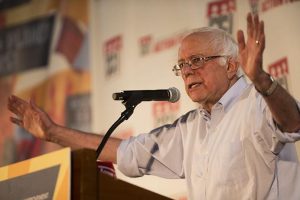From rallies to intimate locales: 2020 Democratic presidential hopefuls are racking up Iowa visits
Early in the 2020 presidential campaign season, Iowa Democrats are seeing candidates up close and personal. That’s intentional.
Sen. Cory Booker, D-N.J. during a community forum at in on Friday, February 8, 2019. Sen. Booker announced his campaign to run for president on February 1, 2019.
March 5, 2019
Iowa is slightly less than a year away from its first-in-the-nation presidential caucuses, and Democratic candidates have begun making campaign stops across the state — more often than not at small, local venues.

Iowa City has seen a variety of events so far, from Sen. Elizabeth Warren, D-Mass., filling the Iowa Memorial Union to Sen. Cory Booker, D-N.J., meeting with voters in an Iowa City resident’s living room. Sen. Kirsten Gillibrand, D-N.Y., held a campaign stop at The Airliner, a restaurant known for pizza and burgers located across the street from the Pentacrest. The restaurant was so packed with people that an overflow crowd of around 20 formed outside the room where she spoke. Other lesser-known candidates have held gatherings at Prairie Lights.
Longtime Cedar Rapids resident Avery Cassell had an opportunity to speak one-on-one with Democratic presidential candidate Gillibrand at the Chrome Horse Saloon in Cedar Rapids in February. He said they talked about his family’s personal struggles with the current health-care system and how Gillibrand plans to reform it.
“I’m just glad I have the opportunity to sit down and listen to her,” Cassell said.
Iowa saw President Trump’s signature rally-style campaign events in large venues such as the U.S. Cellular Stadium in Cedar Rapids in June 2017 when Trump toured the country after his campaign’s victory. This style of campaigning became unique to him as he toured the country and as he continues to campaign into 2020.
Trump’s campaign rallies do not seem to challenge Democratic candidates to campaign the same way, campaign and political experts say. David Yepsen, the host of “Iowa Press” and former Des Moines Register political columnist, said Democratic candidates hosting events at local venues differs from Trump’s rally-style campaign, but the perceived contrast is not the candidates’ main priority.
“You want to have a small-town intimate flavor when you start out,” Yepsen said. “It creates good optics to start your campaign to be seen in a smaller town at a smaller venue.”
Iowa City resident Angela Lambertz, who attended an event at the IMU to see Democratic presidential candidate Warren in February, said she appreciates that she has the opportunity to hear presidential candidates.
“I am so grateful that we have facilities and funding to bring people like Ms. Warren here,” she said. “It’s such a gift.”
Democratic presidential candidate Sen. Kamala Harris, D-Calif., held a town hall in Des Moines upon announcing her campaign, and she held events in large halls and convention centers in Cedar Rapids and Bettendorf. While candidates such as Warren and Harris are able to fill large rooms, the structure of the events still differ from Trump’s rallies.
Local Democratic organizers often provide feedback for campaigns looking to stop by.
Hunter Staszak, the president of the University of Iowa Democrats, said 2020 presidential campaigns typically reach out to his organization with a venue in mind, and the UDems let them know if that would be a realistic option.
Staszak said events at smaller venues are more effective in reaching voters because candidates actually have time to answer questions.
“I think people with actual concerns don’t get a lot of value out of it [campaign rallies],” Staszak said.
Yepsen said he doesn’t think these small-venue campaigns are trying to contrast from Trump.
“[The events] do look different than Trump, but they’re trying to do different things,” Yepsen said. “They’re trying to get in to see key Democrats and activists.”
Yepsen said part of the reason Trump was able to do big rallies early on was because he was already a well-known figure and that there was a “curiosity about Trump.”
University of New Hampshire political-science Professor Dante Scala, an expert on presidential campaigns, said because Trump had a “celebrity status” early on, he was able to attract rally-size crowds because people expected Trump to “put on a show.”
Scala said that in some ways, Trump is reaching back to a 19th-century version of campaigning, when politics was seen as a form of entertainment, while now the house-party events are seen by the public as events for elites and activists who pay close attention to politics.
“Even someone like Kamala Harris or Elizabeth Warren who is already well known — they like to have those smaller venues because they’re more intimate, and that’s what those die-hard activists who are showing up to these things, that’s what they want,” Scala said. “They want that opportunity to say, ‘I met Elizabeth Warren in my neighbor’s kitchen.’ That’s what they crave.”
RELATED: Iowa caucuses candidate tracker: see where candidates are stopping with an interactive map
Scala said even for well-known candidates, getting key activists on board is crucial. He said he sees Trump as being in a class by himself and questioned his patience for small-town meet-and-greets.
“I don’t think most candidates in most campaigns think that they could do what Trump is doing,” Scala said. “There was almost one set of rules for him.”
Prairie Lights co-owner Jan Weissmiller said she believes it’s important for candidates to campaign at local venues so voters can easily access their ideas and platforms.
Weissmiller said candidates have regularly used Prairie Lights as a campaign stop since 2004, when then-Democratic presidential-nomination hopefuls John Kerry and John Edwards visited. Sen. Bernie Sanders, I-Vt., stopped there in 2015, and then-President Barack Obama visited the store in 2009.

Presidential candidate Bernie Sanders speaks during the Bernie Sanders rally at the Field House on Saturday, Jan. 30, 2016. Sanders still remains just slightly under fellow democrat Hilary Clinton in the polls.
Author and Democratic presidential candidate Marianne Williamson made a campaign stop at Prairie Lights in February, and Democratic presidential candidate Andrew Yang plans on visiting in the middle of this month.
“I suppose maybe people choose here because it’s broad-based,” Weissmiller said, referring to the wide demographic of people who shop at Prairie Lights.
Typically, the candidates will speak to a room of about 100-150 people and then have a Q&A-style discussion.
“I think we’re in an exciting election cycle,” Weissmiller said. “Obviously, this is quite early for it to begin, and there are so many candidates in the field, so keep your eye on our website because we’ll probably have more.”
Hamburg Inn No. 2, a restaurant in Iowa City that has stood on Linn Street since 1948, touts a long history of visiting presidential candidates, although the diner has not hosted anyone yet this year.
Hamburg Inn general manager Seth Dudley said candidates have visited the restaurant consistently for about the last 30 years; the trend started when former President Ronald Reagan ate there in the ’90s.
“We have a long history with the community here in Iowa City,” Dudley said. “We get a very good cross section of the population here in Johnson County.”
Dudley said that when Hamburg Inn began the Coffee Bean Caucus in 2003, visits from politicians picked up even more. Mason jars labeled with state and national politicians line the counters where customers can drop a coffee bean into their candidates’ jars. He said this received a lot of media attention, and even NBC’s show “The West Wing” came through and filmed an episode there.
Dudley said prominent politicians have visited Hamburg Inn for so long that the staff there is well-trained and the customers can often expect presidential visits to happen.
“It gives candidates a chance to really connect with voters on a personal basis. It’s much more intimate than just having something at the Field House,” Dudley said, referring to the UI facility where 2016 candidate Sanders hosted a rally and attendees numbered into the thousands.






